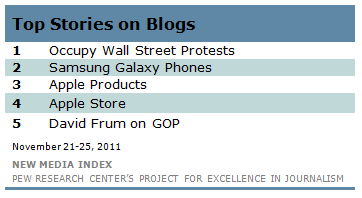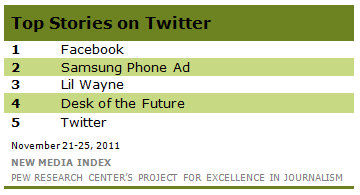 Photographs and footage of police pepper-spraying students in California were widely shared on the internet last week, elevating the Occupy Wall Street movement to top billing on both blogs and YouTube.
Photographs and footage of police pepper-spraying students in California were widely shared on the internet last week, elevating the Occupy Wall Street movement to top billing on both blogs and YouTube.
The Occupy protests have been a subject of internet chatter since they began in mid-September, some weeks ranking high on YouTube, some weeks on Twitter and others on blogs. Much of the discussion surrounding the protests has been in support of the protestors, oftentimes sharing and commenting on footage or photographs taken by people at the protests themselves; in other words, not as much direct, live tweeting or commentary from the protests themselves as support from others outside the events.
The first Occupy story to make the Index came the week of September 26-30. The video of a protester in New York getting pepper-sprayed was a top story on both Twitter and YouTube.
From there, the Occupy protests rose to the top in at least one new media sector almost every week, with users sometimes voicing disgust at how police were acting, talking about the goals of the movement, or complaining about how the press was covering the protests.
Some have voiced disagreement with the Occupy movement, but they have continued to be just a small minority of the commentators overall.
For the week of November 21-25, the online discussion of the Occupy protests focused on the same subject that ignited online conversation back in September: Pepper-spraying seemingly non-threatening protesters, according to the New Media Index from the Pew Research Center’s Project for Excellence in Journalism.
There was an overwhelming response on blogs to footage of a police officer calmly pepper-spraying a group of students at the University of California, Davis, who were sitting on the ground.
“I was stunned and appalled by the UC Davis Police spraying protestors, but struck by how many brave, curious people recorded the events,” wrote Andy Baio at Waxy.
“…it’s almost like he’d never heard of the internet — like he’d been magically transported through time from the 60s or 70s or something!” wrote RoboPanda at UpRoxx.
There were some, though, who were not as sympathetic to the protesters.
“Two of the oh-so-tragic ‘victims’ of the now legendary UC Davis Pepper Spray Massacre foolishly gave an interview to KTVU, appearing perfectly healthy while smiling and almost giggling as they describe the unbearable agony of getting pepper sprayed,” complained Zombie at PJ Tatler.
“But the way the left is acting about this, you’d thing the kids were each shot in the foot or something,” wrote The Right Scoop.*
The video of the event that captured the No. 1 spot on YouTube was of UC Davis’ Chancellor Linda Katehi walking back to her car while the student protesters silently watch her pass. After the pepper-spraying incident, Katehi fought calls for resignation from students and faculty as well as condemnations from state lawmakers for the perceived police brutality.
Katehi later said that campus police officers defied her orders when they used pepper spray on the peaceful student protesters, and she apologized for the use of pepper spray.
A handful of other Occupy-related stories sparked commentary from bloggers as well. One was an offer, reportedly later rescinded, from the city of Los Angeles for office space and a farm at reduced rent.
Another was a clip of Fox News anchor Chris Wallace interrupting commentator Juan Williams when he defended the Occupy movement on Fox News’ Sunday panel and stated that most Americans identify with the problems of economic inequality. Much of the response came from liberal bloggers criticizing Wallace’s interruption.
“While it made for great TV, it also made us worry for Juan,” wrote Betsy Rothstein at Fishbowl DC, “We like your spunk. But interrupt Hall Monitor at your own peril.”
“Juan Williams apparently forgot what network he was working for if he thinks ‘fairness’ is something we’re going to get from Chris Wallace,” wrote Heather at Crooks and Liars.
David Frum
Another story last week inspired liberal bloggers to support an unlikely figure.
Conservative author and former Bush speechwriter David Frum wrote an article for New York magazine in which he questioned whether the Republican Party has lost its touch with reality. Discussion of the article ranked fifth on blogs for the week, with liberal bloggers widely embracing the points raised by Frum.
“I appreciate Frum’s writing because he criticizes the GOP, not with ridicule or disdain, but with deep concern – concern, because he identifies as a Republican, and he knows that there are many good people in the Republican party who recognize that it has lost its way,” wrote E ric Byler at Coffee Party USA.
ric Byler at Coffee Party USA.
“Sage words from a conservative who can still see the bigger picture, and not only the GOP’s alternative reality,” said Lefty Coaster at Daily Kos.
Others who did not identify themselves specifically as liberal also found the piece valuable.
“One hopes that, by bravely speaking out on these issues, David Frum will galvanize what might be called the Great Silent Majority of Republicans to take back their party. Because the sooner America returns to having two reasonable alternatives, the better,” wrote Henry Blodget at Business Insider.
“Well worth your time to read the entire piece,” wrote Christian at Homebrewed Theology.
“An extremely well written essay by David Frum about how the GOP has gone completely off the rails,” said Irenicum at Little Green Footballs, “As a former Republican myself, his account rings very true.”
The Rest of the News on Blogs
Technology dominated the rest of the news discussion on blogs for the week.
In second place was talk surrounding the new operating system called Ice Cream Sandwich for Samsung Galaxy mobile phones. Samsung announced last week that the new system does not have Adobe Flash Player installed.
Bloggers were quick to share the news and to share their sense about the future of Adobe Flash which many see as already on its way out. (Adobe announced on November 9 that it would no longer be developing a Flash browser plugin for mobile phones.)
“Flash is only used on 26 percent of all websites, and is in decline…Even if Flash does get released for Android Ice Cream Sandwich, it might not be as useful as one thinks,” wrote Ingrid Lunden at paidContent.org.
But at least one blogger thought users would miss having Flash.
“Despite what folks (Apple and more) think, there are still plenty of instances in which Flash is necessary for a full Web experience,” wrote Tech-Ex.
In third place on blogs was news about Apple products, always a popular topic online. This past week, the discussion covered purported early details on the 2012 updates to the iPad, iPhone and MacBook Pro and Black Friday discounts the Apple store was offering – which most thought were not great deals.
The epicenter of these deals, the Apple store itself, was the No. 4 story with buzz about a new Apple store in New York’s Grand Central Station and discussion over a Harvard Business Review article written by the former senior vice president for retail at Apple, Ron Johnson, about what he learned building the Apple store.
On Twitter, users shared news that the huge social network Facebook had introduced sponsored notifications on its news ticker. This means that companies can pay for “likes” to show up on Facebook users’ feeds. Twitter users thought this could be useful for advertisers – but also annoying to users.
“Good news for advertisers on #Facebook,” wrote Myles Runham.
“Could be HUGE for political/news orgs,” tweeted Peter Passi.
“Facebook Throws Sponsored Stories Into Your News Ticker. Annoyed yet?” asked Jeff Pabian.
Separately, an article from TechCrunch reported on a study saying that 50% of ecommerce site visitors are also logged into Facebook. Tweeters were impressed by the findings.
“Great proof of Social Commerce,” wrote Dave Knox.
“eCommerce + Facebook = love” wrote Matei Psatta.


